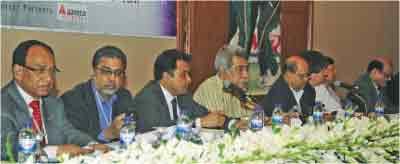Constitution changes okayed

Bangladesh Cricket Board president AHM Mustafa Kamal (3rd from L) speaks during the board's annual general meeting at Sonargaon Hotel in the city yesterday.Photo: STAR
The major changes in the constitution of the Bangladesh Cricket Board (BCB) were approved in an extraordinary general meeting (EGM) at a posh city hotel yesterday.
A long-cherished desire came to fruition when the councillors endorsed the constitution of the regional cricket associations while another encouraging change brought about was that the president from now on will be democratically elected. Presently, the board president is a government nominee.
The highest forum approved the changes as per the proposals from the board's constitutional amendment committee headed by Dewan Shafiul Arefin, keeping in line with the ICC's (International Cricket Council's) recommendations.
The most heated discussion, however, took place regarding the deletion of the clauses which allowed former cricketers the right to become councillors of the board. Ultimately, a majority of the councillors raised their hands in support of the deletion. It is ensured that there will be no cricketer-councillor, fifteen of whom exist in the present constitution, while the forum also dismissed the existence of CWAB (Cricketers' Welfare Association of Bangladesh).
The most potentially harmful part of the amendments was the replacement of the post of chief executive officer (CEO) with that of chief operating officer (COO), curbing his authority over executive powers. Many fear that professionalism and transparency in board activities will take a back seat as a result of this change as the post of the chief financial official (CFO) has also been abolished. The change has slashed the executive power of the top official which means that the board activities will be run by amateurs instead of professionals.
"We made the changes to wipe out the contradictions in the constitution. The proposals and amendments which have been approved in the EGM today will be sent to the National Sports Council [NSC]," said BCB president AHM Mustafa Kamal during an official press briefing following the EGM. The EGM was followed by the annual general meeting (AGM).
The administrative zone will be divided into eight zones to decentralise cricket administration in the country, an issue at the centre of discussion regarding BCB's policy-making since Bangladesh's elevation to Test status in 2000.
"We carried the promise for regional cricket associations for long and today we have started the journey. Initially we will start with six zones and gradually it will increase but not more than eight. We divided it zone-wise for a permanent solution because you know any time the number of divisions can increase through government order," explained Kamal.
Regarding changes to the CEO's post, Kamal said: "We brought the changes because there was a clash between the CEO and the standing committees, so a solution to this was needed to smoothly run the board's activities."
Shafiul Arefin explained the reasons behind the abolishment of the clauses which shut the doors for former cricketers to become councillors only on their strength of their status as former cricketers.
"We reviewed other Test nations' constitutions and none had such a provision. And most importantly, it contradicted our constitution which has a specific guideline about affiliation. You have to come through an institution if you want to be a councillor. We just followed the laws. Our main focus was to put everything in a formula and wipe out the contradictions in the constitution," said Arefin, a former national footballer, adding that the AGM can do anything as it is the highest forum.
An influential BCB director, Arefin also said that the forum had decided to recognise CWAB if they could submit proper documents.

 For all latest news, follow The Daily Star's Google News channel.
For all latest news, follow The Daily Star's Google News channel. 



Comments